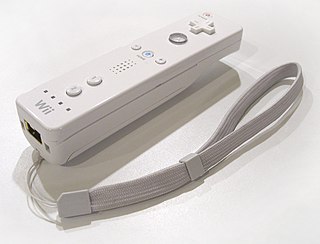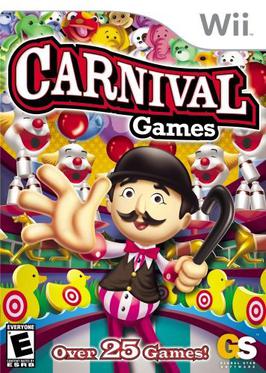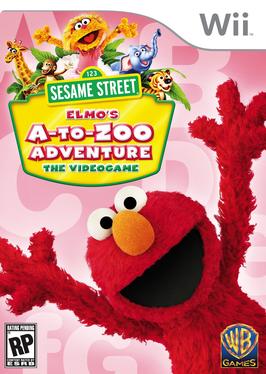
The Wii is a home video game console developed and marketed by Nintendo. It was released on November 19, 2006, in North America and in December 2006 for most other regions of the world. It is Nintendo's fifth major home game console, following the GameCube and is a seventh-generation console alongside Microsoft's Xbox 360 and Sony's PlayStation 3.
The Virtual Console was a line of downloadable video games for Nintendo's Wii and Wii U home video game consoles and the Nintendo 3DS family of systems.

Rayman Raving Rabbids is a 2006 party video game developed and published by Ubisoft. The game is a spinoff in the Rayman series. The game consists of 75 minigames. The game was released for the PlayStation 2, Wii, Xbox 360, and Microsoft Windows systems, with a different version released for Game Boy Advance, Nintendo DS and mobile phones. Versions for GameCube, Xbox, PlayStation 3, and PlayStation Portable were planned, but were later cancelled.

The Wii Remote, also known colloquially as the Wiimote, is the primary game controller for Nintendo's Wii home video game console. An essential capability of the Wii Remote is its motion sensing capability, which allows the user to interact with and manipulate items on screen via motion sensing, gesture recognition, and pointing which is used for the console, using accelerometer and optical sensor technology. It is expandable by adding attachments. The attachment bundled with the Wii console is the Nunchuk, which complements the Wii Remote by providing functions similar to those in gamepad controllers. Some other attachments include the Classic Controller, Wii Zapper, and the Wii Wheel, which has originally been used for the racing game, Mario Kart Wii.

TMNT is an action video game featuring the Teenage Mutant Ninja Turtles. It was developed by Ubisoft Montreal and published by Ubisoft for Xbox 360, Wii, PlayStation 2, GameCube, Nintendo DS, and PlayStation Portable, as well as for Microsoft Windows on March 20, 2007. It is based on the 2007 film of the same name. Versions of the game for the original Xbox and PlayStation 3 were also planned but cancelled.

Mario & Sonic at the Olympic Games is a crossover sports and party game developed by the Sega Sports R&D Department. It is the first installment on the Mario & Sonic series. It was published by Nintendo in Japan and by Sega in other regions, and released on the Wii in November 2007 and the Nintendo DS handheld in January 2008. The first official video game of the 2008 Summer Olympic Games, it is licensed by the International Olympic Committee (IOC) through exclusive licensee International Sports Multimedia (ISM), and is the first official crossover game to feature characters from both the Mario and Sonic the Hedgehog series.

Carnival Games is a video game for Wii, Nintendo DS and iPhone. It was the last game published by Global Star Software, before it was absorbed into Take-Two Interactive.

The Japanese multinational consumer electronics company Nintendo has developed seven home video game consoles and multiple portable consoles for use with external media, as well as dedicated consoles and other hardware for their consoles. As of September 30, 2021, in addition to Nintendo Switch, Nintendo has sold over 863.07 million hardware units.
There have been a variety of Sesame Street video games released for video game platforms. Most of the Sesame Street video games were published and developed by NewKidCo.

Need for Speed: Nitro is a racing video game and the fourteenth title of the Need for Speed series. It was published by Electronic Arts for the Wii and Nintendo DS platforms. It is also one of only two games in the franchise to date to not be made for PC and the only game of the franchise to be released only for Nintendo consoles. It was announced in January as part of a three-game announcement that includes Need for Speed: Shift and Need for Speed: World. The game was developed by EA Montreal who have previous experience with Nintendo titles, although the DS version was developed separately by Firebrand Games' Florida studio. An improved version of the DS edition of the game, Need for Speed: Nitro-X, was released for DSiWare on November 26, 2010.
Ivy the Kiwi? is a platform video game developed by Prope and designed by Yuji Naka. The Windows Mobile version was released in Japan in November 2009 and in North America in January 2010. That same year, versions for Wii and Nintendo DS were published by Namco Bandai Games in Japan, by Xseed Games in North America, and by Rising Star Games in Europe. The game was ported and released for iOS in October 2012 and Android in August 2013.

Dream Pinball 3D is a pinball simulation game developed by TopWare and published by SouthPeak Games for Microsoft Windows, first released online in 2006, and then ported to Wii and Nintendo DS in 2008. Dream Pinball 3D features six tables to play on, each with a distinct theme, including a medieval table, an aquatic table, a monsters table, and a dinosaurs table. Apart from the different visual styles, each of these tables pose a different challenge because of their varying flipper, ramp, and bumper positions.

Pac-Man Party is a party game by Namco Bandai Games for the Wii and Nintendo 3DS. It is similar to the Mario Party series and Monopoly games for the Wii. In the game's story mode, players must retrieve a stolen cookie recipe from Pac-Man's enemies Blinky, Pinky, Inky, and Clyde by going to a location called Mirage Oasis and return the recipe to its rightful owner, Mr. Cookie. The game was released to coincide with Pac-Man's 30th anniversary.

Super Smash Bros. for Nintendo 3DS and Super Smash Bros. for Wii U are two 2014 crossover platform fighter video games developed by Bandai Namco Studios and Sora Ltd. and published by Nintendo for the Nintendo 3DS and Wii U video game consoles. It is the fourth installment in the Super Smash Bros. series, succeeding Super Smash Bros. Brawl. The Nintendo 3DS version was released in Japan on September 13, 2014, and in North America, Europe, and Australia the following month. The Wii U version was released in North America, Europe, and Australia in November 2014 and in Japan the following month.
The eighth generation of video game consoles began in 2012, and consists of four home video game consoles: the Wii U released in 2012, the PlayStation 4 family in 2013, the Xbox One family in 2013, and the Nintendo Switch family in 2017.

The Wii U GamePad is the standard game controller for Nintendo's Wii U home video game console. Incorporating traits from tablet computers, the GamePad has traditional input methods, touchscreen controls, and motion controls. The touchscreen can be used to supplement a game by providing alternate, second screen functionality or an asymmetric view of a scenario in a game. The screen can also be used to play a game strictly on the GamePad screen, without the use of a television display. Conversely, non-gaming functions can be assigned to it as well, such as using it as a television remote.

Majesco Entertainment Company is an American video game publisher and distributor based in Hazlet, New Jersey. The company was founded as Majesco Sales in Edison, New Jersey in 1986, and was a privately held company until acquiring operation-less company ConnectivCorp in a reverse merger takeover, becoming its subsidiary and thus a public company on December 5, 2003. ConnectivCorp later changed its name to Majesco Holdings Inc. on April 13, 2004.

Sesame Street: Elmo's A-to-Zoo Adventure is a Sesame Street video game developed by American company Black Lantern Studios, released on October 19, 2010 from Warner Bros. Interactive Entertainment for Microsoft Windows, Wii, and Nintendo DS. It also shared the same release date, developer and platforms as Sesame Street: Cookie's Counting Carnival.

Sesame Street: Ready, Set, Grover! is a Sesame Street video game that was released on August 2, 2011. The game is available for the Wii and Nintendo DS and promotes healthy advice, as part of Sesame Workshop's Healthy Habits for Life project. Unlike 2010's Cookie's Counting Carnival and Elmo's A-to-Zoo Adventure, Grover was not released on Microsoft Windows.

Sesame Street: Elmo's Musical Monsterpiece is a Sesame Street video game that was released on June 15, 2012 for the Wii and Nintendo DS systems.
















